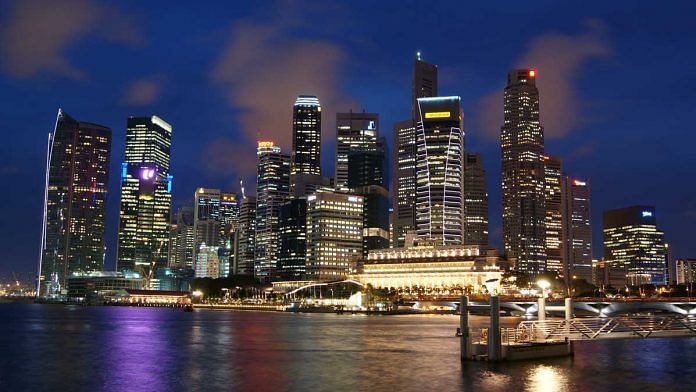New Delhi: Singapore has a message for people defying social-distancing norms amid the Covid-19 pandemic — pay a fine of up to $10,000 (Singapore Dollar, just over Rs 5 lakh) or serve up to six months in jail.
The punishment also applies to people returning from abroad who defy the mandatory 14-day quarantine.
The Singapore government has now empowered quarantine and social-distancing requirements with penal provisions as it battles a growing number of infections. According to a report by Singapore-based media outlet Channel News Asia, the country has recorded 802 Covid-19 cases.
On Sunday, the city-state reported its third Covid-19 death, a 70-year-old man with “no recent travel history to affected countries and regions”.
Last Wednesday, Singapore witnessed its largest single-day spike in cases with 73 people testing positive. Another 70 tested positive within a day Saturday.
Also Read: Restrict sales of chloroquine & other Covid-19 drugs: Chemists’ lobby tells members
Getting strict in light of pandemic
The new penalties were notified on 26 March under the country’s Infectious Diseases Act.
The regulations on “safe distancing” seek to “limit gatherings outside of work and school to 10 persons or fewer, and ensure that physical distancing of at least one metre is maintained in settings where interactions are non-transient”.
A second section deals with “stay home notices” that the government has issued to “all travellers, including Singapore Citizens, Permanent Residents and Long Term Pass holders returning to Singapore” beginning 20 March. The notice requires recipients to stay home for 14 days.
Any violation on either count will make offenders “liable on conviction to a fine not exceeding [Singapore dollars] $10,000 or to imprisonment for a term not exceeding 6 months or to both”, the health ministry has said.
Singapore, a country of 60 lakh people that has so far been lauded for containing the spread of Covid-19 despite being one of the first countries outside of China to report incidence, is taking some strict measures to contain the pandemic’s spread.
On Sunday, a Singapore citizen’s passport was cancelled because he violated the ‘stay home notice’.
However, most schools remain open, with the Singapore education ministry saying that students will be allowed to study from home one day a week from April even as it states that “our desire is to still keep our schools open most days of the week”.
Singapore follows a colour-coded framework called ‘Disease Outbreak Response System Condition (DORSCON)’ to assess the spread of a disease, which dictates its reactions.
The DORSCON spectrum runs from green (least serious stage) to yellow, orange and red (the most serious stage where disease has highest impact). Currently, Singapore assesses its situation vis-a-vis Covid-19 to be orange.
The status was also orange during the SARS outbreak in the early noughties, which, according to the Singapore government, means “the disease was severe and spread easily, but still contained.”
Many countries around the world have imposed strict punishments to enforce social-distancing norms that are believed to be key to preventing the spread of coronavirus, including Argentina and Jordan. According to a 20 March report, around 50,000 people were booked over eight days in Italy, the second epicentre of Covid-19 after China, for violating quarantine rules and faced prison time or fines.
Also Read: The fall of NRI: How Covid-19 has altered the image of Punjab’s darling community




News published on Thursday , 26 March 2020 , in report – ‘ Singapore Airlines calls for trading halt pending announcement’ – at businesstimes.com.sg reads as follows :-
“ The Businesstimes reported on Tuesday that the flag carrier’s pilots will be placed on compulsory no-pay leave of between four and seven days a month starting April 1. This comes as the airline and its unions work together to save jobs in what has been described as an unprecedented crisis for global aviation amid the novel coronavirus situation”.
In this context , it is apt to refer readers to related predictive alert in this Vedic astrology writer’s article – “ Some glimpses of coming year 2020 for Singapore” – brought to public domain widely in Singapore last year 2019 on 20 and 21 October. The said related predictive alert is reproduced here from the article :-
“Singapore in the first half of the year 2020 appears to be battling with the roadblocks in economic, trading, and national issues. The period from April to June 2020, particularly May-June , are likely to present need to trackle roadblocks in the field of cinema or hotel industry or such products as are aimed at invigorating common health. Some inordinate delay in response or non-cooperative behaviour of some nations can be a cause of worrisome concern. Issues having something to do with sea or sea-products are likely to present worrisome concerns, may even generate or mean heavy expenses. Partnership or co-operative enterprises need some attention. Aviation and tourism sectors may call for more care and appropriate strategy during April to June 2020 in particular. More care may be taken while handling or storing or dealing with fire, gas, chemical, hydro-power, and energy resources during these three months , particularly May-June of the year. Mineral and metals and industry related thereto could present some worries. Some unforeseen worrisome concerns in trading of iron and steel, thermal coal can be likely. Grievances of labour class or workers may engage attention, and could impact trade and industry during said three months. Some worrisome concerns surrounding trade or trade agreements with one or more countries can arise for addressing.”
It may be observed from these documented readings that the predictive alert of this writer , much prior , can be viewed as unique , precise and accurate.